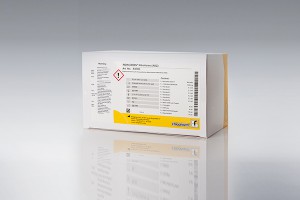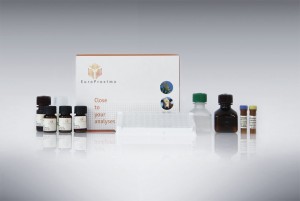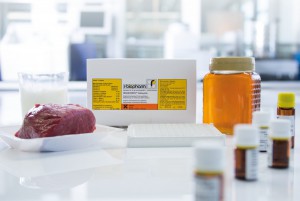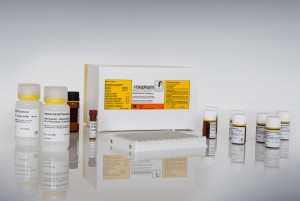General information:
Nitrofurans are synthetic broad-spectrum antibiotics, which are frequently used in animal production due to their excellent antibacterial and pharmacokinetic properties. They have also been used as growth promoters during the production of shrimp, poultry and pigs. Long term animal experiments have shown that the parent compounds and their metabolites have carcinogenic and mutagenic characteristics. This led to the prohibition of nitrofurans for the treatment of animals used for food production. In 1993, the EU banned the nitrofurans furaltadone, nitrofurantoin and nitrofurazone for use in animals used as sources of food, and in 1995 the use of furazolidone was also prohibited.
The aof nitrofurans are based on the detection of the tissue bound metabolites of nitrofurans. The parent compounds are difficult to detect accurately since they are metabolized very rapidly after treatment. The tissue bound nitrofuran metabolites however are present for a long time after administration and they are used to detect nitrofuran abuse. Prior to analysis, the metabolites have to be derivatized by incubation with 2-Nitrobenzaldehyde (2NBA) into Nitrophenyl-(NP) AHD, NP-AMOZ, NP-AOZ and NP-SEM.
Specifications
| Art. No. | R3715 |
|---|---|
| Test format | Microtiter plate with 96 wells (12 strips with 8 removable wells each) |
| Sample preparation | homogenization, derivatization, extraction, centrifugation, evaporation and defatting Detailed Application Notes for fish and shrimp, describing each an uniform sample preparation with the ability to analyze the same sample extract in all 4 RIDASCREEN® Nitrofuran ELISA tests, are available on request. |
| Incubation time | 1 h 15 min |
| Detection limit | Shrimp: approx. 300 ng/kg (ppt) Meat (beef, pork): approx. 300 ng/kg (ppt) Fish: approx. 360 ng/kg (ppt) Meat (chicken): approx. 400 ng/kg (ppt) (corresponding to the standard substance) |
| Cross reactivity | Nitrophenyl- (NP) SEM (standard substance): 100 % |
Reader Comments








